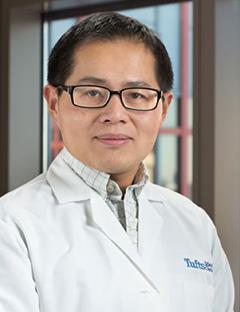
Howard Chen

Research/Areas of Interest
Our research focuses on developing molecular imaging contrast agents to investigate cell death processes, namely apoptosis, necrosis and autophagy in the in vivo environment. He reported, for the first time, the ability to image autophagy activation in a living mouse heart with ischemia-reperfusion injury. Through imaging, he also demonstrated that the autophagy activation is cardioprotective, reducing both cardiomyocyte cell death and final infarct size. The molecular imaging toolbox developed further allows the complex interplay among cell death pathways to be studied in vivo.
He also applied molecular imaging to study inflammation and fibrogenesis with targeted gadolinium (Gd) chelates. The targeted Gd chelates rely on fundamental chemical reactions between the probes and the targeted ligands activated during the disease processes. Once bound, the probe gives off a magnetic signature, allowing the perturbed microenvironment of the diseased organ to be investigated in vivo by molecular Magnetic Resonance imaging. The detection is non-invasive, quantitative, and amendable to longitudinal serial imaging to track disease progression and treatment response. The imaging probes are designed based on clinically approved contrast agents and are cleared readily from the body and with well-established biosafety profile. Multiplexed imaging of cell death, inflammation and fibrosis can provide invaluable insights into disease processes and tissue repair.
To bridge molecular imaging to novel therapeutics, Dr. Chen has demonstrated that several cell-death sensing nanoparticles and nanoprobes that detect cell death can also slow or prevent cell death to enhance cell survival. The dual-capability (diagnostic and therapeutic, thus theranostic) imaging probes were validated in cell culture and in mouse models with cardiac injury. The ability to image and simultaneously apply therapeutics and monitor treatment response at the molecular and cellular levels non-invasively in vivo is novel and with translational potentials.
Education
- PhD, Boston College, United States, 2008
- BS, Brandeis University, United States, 1999
- BA, Brandeis University, United States, 1999